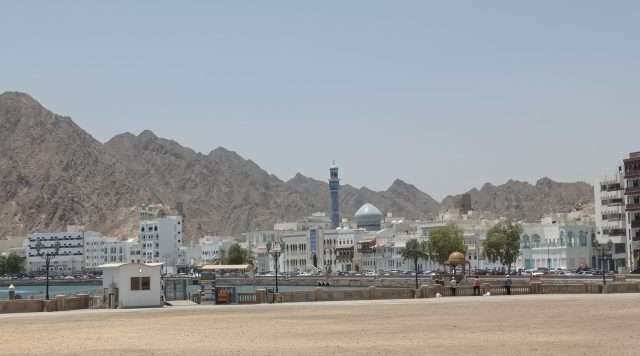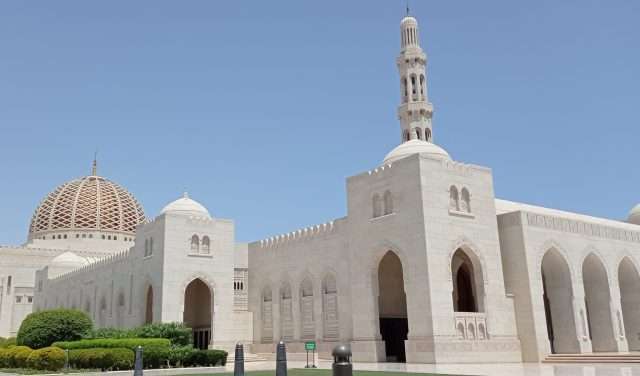Oman: regional role, development strategy and media. Report from Muscat

Geopolitical Report ISSN 2785-2598 Volume 20 Issue 7
Author: Silvia Boltuc
Located in the south of the Arabian Peninsula, the Sultanate of Oman has elaborated a strategy to establish balanced relations with regional and international actors, improve social living conditions, attract foreign direct investments (FDIs), and promote its historical identity and traditions.
Looking at the map of the Middle East, Oman is positioned at the centre of the markets of the Gulf Cooperation Council (GCC) ‘s countries. Thanks to its port infrastructures and Free Economic Zones (FEZ), Oman might become a logistic hub at the crossroads of trade that reaches Africa and the West from South-East Asia.
Indeed, Omani coasts provide access to international waters through the Arabian Sea and the strategic Strait of Hormuz (through which a third of the world oil trade passes) without being subject to its instability. Furthermore, thanks to its strategic location, the Government of Oman signed agreements with Beijing to become part of the Chinese Belt and Road Initiative (21st Maritime Silk Road) and thanks to recent agreements between Muscat and Tehran, the Omani ports might relate to the International North-South Transport Corridor (INSTC) and reach the Russian markets.[1]
Omani economy, investments and fiscal policies
The Sultanate of Oman has invested copious funds in developing its infrastructures (airports, ports, free trade zones and industrial areas). In the first three months of 2022, as oil revenues rose, the country recorded a budget surplus of 357 million rials (927 million dollars), promising to increase spending on priority development projects and reduce its debt.[2]
According to the Ministry of Finance, revenues increased by more than 66% during the quarter, reaching about 3 billion rials, a much higher amount than 1.8 billion a year ago, while total spending stood at 2,7 million rials.[3] In line with the International Monetary Fund, the Ministry predicts that the economy will grow by 5.6% in 2022.[4] Muscat has also signed several Free Trade Agreements with Arab countries (Oman is a member of the GCC), Singapore, EFTA countries, and the United States. These agreements reduce or exempt the parties from customs duties.
The Government of Muscat has adopted policies to encourage foreign direct investments (FDIs). Therefore, under the current fiscal regulations, investors can keep ownership of 100% of their assets, there are no minimum investment capital constraints, no personal income tax, and corporation tax is only 15 % of the net income. The Sultanate also introduced further incentives to attract investments: reduction of government taxes, reduction of rents in some areas, the possibility to select 88 different business opportunities to invest, the chance of purchasing territories for industrial, tourist or residential purposes and a bureaucracy streamlined which translates into facilitated telematic processes to start a business without having to go through the approval of various bodies.[5]
Tourism, energy exports and trade opportunities
The country has opened to foreign visitors and aims to encourage its tourism, a fundamental element in the cultural diplomacy on which Oman has concentrated its commitment also in Italy.[6] The Government of Muscat seeks to promote the typical hospitality of the Omani population combined with the history and landscape richness of the country to transform it into an attractive tourist destination. In this regard, on June 7th, 2022, the Ministry of Culture, Sport and Youth of Oman, in collaboration with the Embassy of the Sultanate of Oman in Rome, will inaugurate an exhibition dedicated to presenting Omani tourist opportunities to the Italian audience, confirming Muscat’s interests in enhancing diplomatic, commercial and tourist relations with Rome.[7]
In the post-pandemic period marked by the conflict in Ukraine and the race for energy diversification in Europe, Oman might represents a precious opportunity. The Sultanate, like the other Gulf countries, has vast hydrocarbon resources, is part of the OPEC + cartel and is the largest oil producer in the Middle East outside the OPEC cartel. In April this year, it is estimated that the Sultanate pumped 840,000 barrels per day.
Three main aspects might make Oman an ideal partner for energy exports: the strategic position of its ports, easily accessible by large tankers, a high level of stability and safety within the complex Middle Eastern framework, and the mediator role that the Sultanate has played in regional dynamics.[8] Indeed, Muscat has tried to mediate between Saudi Arabia and the Islamic Republic of Iran to facilitate a resolution of the conflict in Yemen.[9] In fact, in 2015, Oman opposed the Saudi Arabian-led military intervention in Yemen, confirming Muscat’s approach to regional controversies based on diplomacy. The Sultanate of Oman also played a leading role in facilitating contacts between the United States and Iran before signing the Joint Comprehensive Plan of Action (JCPOA) and securing the release of British citizens held in Iranian prisons.[10]
Iranian President Ebrahim Raisi’s recent visit to the Omani capital and the meeting with Sultan Haitham bin Tariq confirmed the good bilateral relations between Muscat and Tehran. During the visit, the Iranian Minister of Oil, Javad Owji, signed an agreement with the Omani counterparts to jointly develop the Hengam field in the Persian Gulf. The Hengam oil field is located near the homonymous Iranian island between Iran and the maritime territory of Oman. The two countries also agreed to exchange petrochemicals and related technical and engineering skills. The supply of Iranian gas to Oman through a new pipeline was also discussed within these cooperations.[11]
In recent days, the Omani Minister of Energy and Minerals, Mohammed bin Hamad al-Rumhi, informed local news agencies that the country discovered new oil fields that will increase the national production from 50,000 to 100,000 barrels over the next two or three years. Current crude oil reserves amount to 5.2 billion barrels and gas reserves approximately 24 trillion cubic feet. Oman is stepping up exploration activities to help maintain or increase oil and condensate production depending on market needs.[12]
Omani hydrocarbon resources and the current energy crisis in Europe due to the Ukraine conflict and the Western sanctions against Russia have pushed several European countries to begin or improve their energy partnership with Oman. For instance, at the end of May 2022, the Czech Republic held talks for Oman’s liquid natural gas (GLN) supplies. Representatives of the Ministry of Industry and Trade of the Czech Republic, as well as the energy companies of the conglomerate ČEZ and Pražská Plynárenská, held meetings with the management of the Oman LNG company and discussed the possibility of organizing LNG supplies from Oman to the Czech Republic.[13]
Underlining once again the mediating role played by the Sultanate, in May 2022, the Russian Foreign Minister Sergej Lavrov and his Omani counterpart Sayyid Badr Hamad Al Busaidi met to discuss Syria, Palestine and the Conflict in Ukraine, as well as enter into bilateral agreements. The Sultan of Oman, Haitham bin Tariq Al Said, also received Lavrov. Concerning the Syrian context, Moscow welcomed the Omani positions as the Government of Muscat was the only GCC Council country that in 2011 did not suspend diplomatic relations with the Government of Syrian President Bashar al Assad. Russia and Oman, both members of OPEC +, reiterated the importance of their cooperation in stabilizing prices in the energy market and as mediators for regional conflicts. Oman’s foreign minister said his country is grateful to the Russian government for its role in the talks to revive the Iranian nuclear deal (JCPOA).[14]

Media and civil society in Oman
During the last years, the Government of Muscat has adopted policies to ensure greater inclusiveness, gender equality, and press freedom. In this regard, the Sultanate hosted the 31st World Congress of the International Federation of Journalists (IFJ) from May 31st, 2022, to June 4th, 2022. Sayyid Asaad bin Tarik al Said, Deputy Prime Minister in charge of International Relations and personal representative of Sultan Haitham bin Tarik, chaired the event, which gathered more than 260 media representatives from 92 countries around the globe to discuss several issues related to media, including freedom press and journalists’ safety.[15]
The Chairman of the Board of Directors of the Association of Journalists of Oman opened the event by recalling during his speech the Palestinian journalist Shireen Abu Aqleh, who was killed while monitoring the incursion of Israeli forces into the Palestinian city of Jenin. The IFJ denounced the threat to security faced by journalists in countries such as Afghanistan and Yemen. Oman has expressed itself as a spokesperson for the principles of justice and tolerance of international law and joined the call to guarantee better working conditions for journalists, especially women.
Conclusion
Given its strategic position, the balanced foreign policy and the mediating role played between antagonist countries in the Middle Eastern and international scene, the hydrocarbon resources, a society projected towards modernity and cooperation with the West, the Sultanate of Oman is an interesting actor from a geopolitical and economic point of view.
Muscat, which is pursuing economic strategies that guarantee an income to future generations, is still a relatively virgin land for investment. Although some international companies have signed cooperation contracts with Omani companies, the Sultanate opened its market relatively late to foreign investors compared to the other players in the Gulf. This makes Oman a particularly attractive market for the near future.
Sources
[1] Tehran Times (2022) Iran, Oman confer on forming roadmap to expand trade ties. Link: https://www.tehrantimes.com/news/472810/Iran-Oman-confer-on-forming-roadmap-to-expand-trade-ties.
[2] Muscat Daily (2022) Oman reports RO357mn budget surplus in Q1. Link: https://www.muscatdaily.com/2022/05/09/oman-reports-ro357mn-budget-surplus-in-q1/.
[3] Times of Oman (2022) Oman’s General Budget registers financial surplus. Link: https://timesofoman.com/article/116477-omans-general-budget-registers-financial-surplus.
[4] Hamoud al Mehrzi (2022) Economic growth back on track in Oman, Zawya. Link: https://www.zawya.com/en/economy/gcc/economic-growth-back-on-track-in-oman-yk2g1td9.
[5] The author of this Geopolitical Report acknowledged investment guidelines in Oman during the presentation that Dr Muhanna Al Senani, the Head of Section, Identifying Sectors and Investors at Ithraa, held in Muscat on May 31st, 2022.
[6] Jeremy Jones, Nicholas Ridout (2013) Oman, culture and diplomacy, Edinburgh University Press.
[7] Eventi della Tuscia (2022) Al Parco archeologico del Colosseo la mostra “Oman Cultural Days in Rome”. Link: https://www.eventidellatuscia.it/78910-giugno-2022-roma-al-parco-archeologico-del-colosseo-la-mostra-oman-cultural-days-in-rome/.
[8] James Worrall (2021) “Switzerland of Arabia”: Omani Foreign Policy and Mediation Efforts in the Middle East, The International Spectator, Vol. 56(4), pp. 134-150, DOI:10.1080/03932729.2021.1996004
[9] NourNews (2022) President Raisi’s visit to Muscat manifests good neighborliness. Link: https://nournews.ir/En/News/97144/President-Raisi%E2%80%99s-visit-to-Muscat-manifests-good-neighborliness.
[10] Amwaj Media (2022) Oman revs up regional mediation with Houthi prisoner release, Iran-Saudi talks. Link: https://amwaj.media/media-monitor/omani-mediation-frees-houthi-detainees-advancing-effort-to-end-war.
[11] Nishant Ugal (2022) Iran and Oman agree to jointly develop Hengam offshore oilfield in the Persian Gulf, UpStream Energy Explored. Link: https://www.upstreamonline.com/field-development/iran-and-oman-agree-to-jointly-develop-hengam-offshore-oilfield-in-the-persian-gulf/2-1-1224218.
[12] Silvia Boltuc (2022) Oman. Scoperti nuovi giacimenti petroliferi, Notizie Geopolitiche. Link: https://www.notiziegeopolitiche.net/oman-scoperti-nuovi-giacimenti-petroliferi/.
[13] Aneta Zachova (2022) Czechia negotiates LNG imports from Oman, Euractiv. Link: https://www.euractiv.com/section/energy-environment/news/czechia-negotiates-lng-imports-from-oman/.
[14] Krasnaja Vesna (2022) Россия и Оман заявили о начале взаимовыгодного сотрудничества — МИД РФ (Russia and Oman announced the beginning of mutually beneficial cooperation – Russian Foreign Ministry). Link: https://rossaprimavera.ru/news/79ed891c; Tass (2022) Россия и Оман намерены завершить работу над соглашением о безвизовом режиме (Russia and Oman intend to complete work on an agreement on a visa-free regime). Link: https://tass.ru/obschestvo/14594821.
[15] SpecialEurasia (2022) SpecialEurasia attends the 31st World Congress of the International Federation of Journalists in Oman. Link: https://www.specialeurasia.com/2022/05/31/specialeurasia-ifj-media-oman/.
* Report in media partnership with Notizie Geopolitiche. It is possible to read the report in Italian at the following link: Oman. Ruolo regionale, strategia di sviluppo e media.
